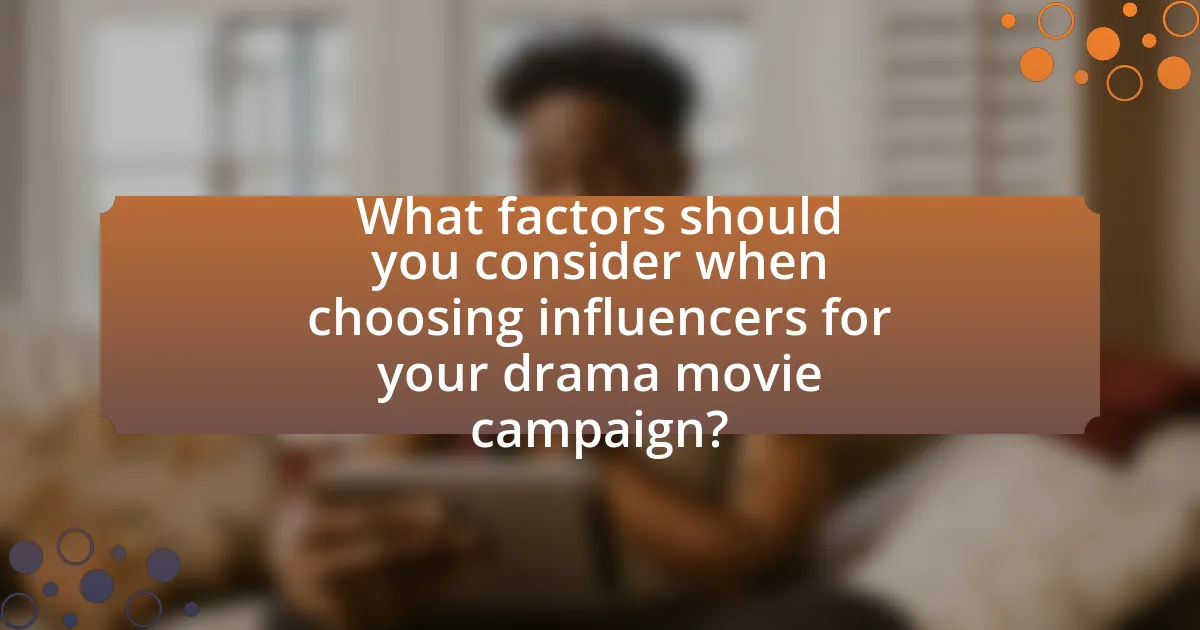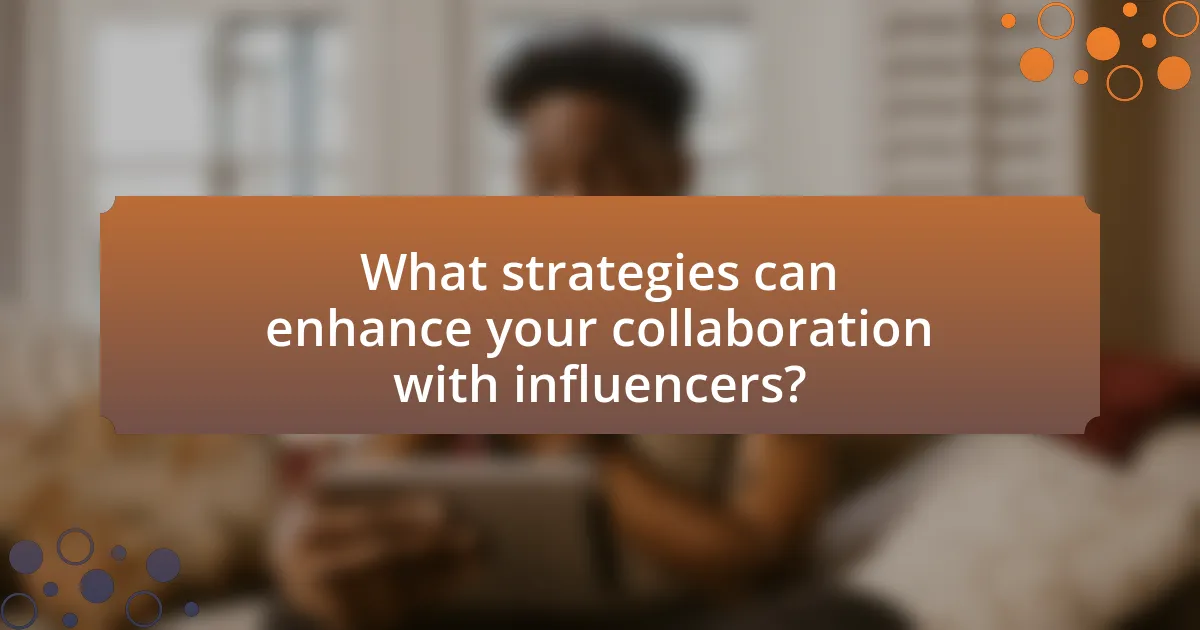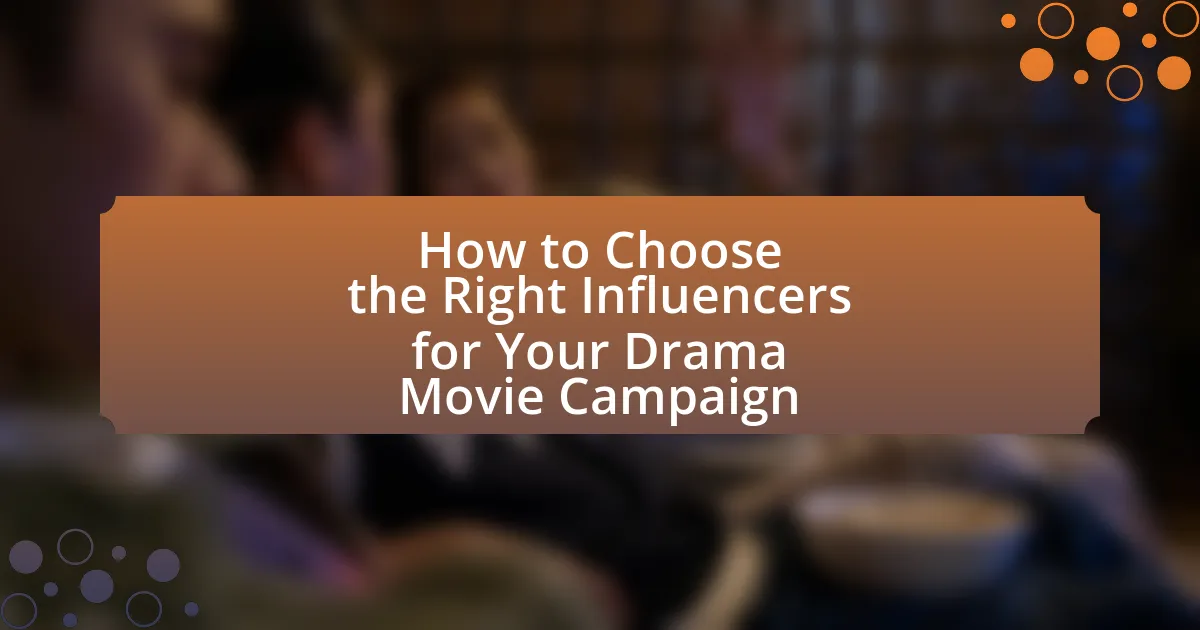The article focuses on selecting the right influencers for a drama movie campaign, emphasizing the importance of audience alignment, engagement rates, and content relevance. It outlines strategies for identifying the target audience, understanding key demographics, and leveraging audience interests to enhance influencer selection. The piece also categorizes different types of influencers, including micro, macro, and mega influencers, and discusses how their niches affect suitability for the campaign. Additionally, it highlights the significance of authenticity and engagement in influencer marketing, providing practical tips for evaluating potential influencers and managing relationships effectively to ensure a successful promotional campaign.

What factors should you consider when choosing influencers for your drama movie campaign?
When choosing influencers for your drama movie campaign, consider their audience alignment, engagement rates, and content relevance. Audience alignment ensures that the influencer’s followers match the target demographic of the movie, which is crucial for effective outreach. Engagement rates indicate how actively the influencer’s audience interacts with their content, providing insight into potential reach and impact. Content relevance assesses whether the influencer’s style and themes resonate with the drama genre, enhancing authenticity and connection with viewers. For instance, a study by Influencer Marketing Hub found that campaigns with highly relevant influencers can achieve up to 11 times higher ROI compared to less relevant partnerships.
How do you identify the right audience for your drama movie?
To identify the right audience for your drama movie, conduct thorough market research to understand demographics, interests, and viewing habits. This involves analyzing data from similar films, utilizing audience segmentation tools, and gathering insights from social media platforms where potential viewers engage with drama content. For instance, a study by the Motion Picture Association found that 60% of drama moviegoers are aged 18-34, indicating a key demographic to target. Additionally, surveys and focus groups can provide qualitative insights into audience preferences, helping to refine marketing strategies and influencer partnerships effectively.
What demographics are most relevant to your film’s target audience?
The most relevant demographics for a film’s target audience typically include age, gender, income level, and education. For drama movies, the target audience often skews towards adults aged 25-54, with a balanced gender representation. Research indicates that individuals within this age range are more likely to engage with complex narratives and character-driven stories, which are hallmarks of the drama genre. Additionally, higher income levels and education often correlate with a greater appreciation for nuanced storytelling, making these demographics particularly significant for marketing strategies in drama film campaigns.
How can audience interests influence influencer selection?
Audience interests significantly influence influencer selection by ensuring that the chosen influencers resonate with the target demographic of the campaign. When influencers align with the interests of the audience, they can effectively engage and motivate that audience to take action, such as watching the drama movie. For instance, if the target audience is primarily interested in romantic themes, selecting influencers who frequently discuss or promote romantic content can enhance the campaign’s relevance and impact. Research indicates that campaigns utilizing influencers who share common interests with their audience achieve up to 11 times higher return on investment compared to those that do not. This correlation underscores the importance of matching influencer content with audience preferences to maximize engagement and effectiveness in promotional efforts.
What types of influencers are available for movie campaigns?
There are several types of influencers available for movie campaigns, including celebrity influencers, micro-influencers, niche influencers, and social media influencers. Celebrity influencers, such as well-known actors or directors, can attract large audiences and generate significant buzz around a film. Micro-influencers, who typically have smaller but highly engaged followings, can create authentic connections with their audience, making them effective for targeted marketing. Niche influencers specialize in specific genres or themes, allowing for tailored promotions that resonate with particular demographics. Social media influencers leverage platforms like Instagram, TikTok, and YouTube to reach diverse audiences, often using creative content to engage viewers. Each type of influencer can play a unique role in enhancing a movie’s visibility and appeal.
What are the differences between micro, macro, and mega influencers?
Micro influencers have between 1,000 to 100,000 followers, macro influencers range from 100,000 to 1 million followers, and mega influencers have over 1 million followers. Micro influencers typically engage with niche audiences, resulting in higher engagement rates and trust, while macro influencers offer broader reach and visibility but may have lower engagement. Mega influencers, often celebrities, provide extensive exposure but can lack the personal connection that micro influencers maintain with their followers. This differentiation is crucial for selecting the right influencer type based on campaign goals, audience targeting, and budget considerations.
How does the influencer’s niche affect their suitability for your drama movie?
The influencer’s niche directly impacts their suitability for your drama movie by aligning their audience’s interests with the film’s themes and target demographic. For example, an influencer specializing in emotional storytelling or character-driven content can effectively engage viewers who appreciate drama, thereby enhancing the film’s visibility and relevance. Additionally, influencers with a niche in film critique or cinematic analysis can provide insightful commentary that resonates with audiences seeking depth in storytelling, which is crucial for a drama movie’s success.
Why is influencer engagement important for your campaign?
Influencer engagement is crucial for your campaign because it directly impacts audience reach and trust. Engaged influencers can effectively communicate your message to their followers, leading to higher conversion rates. According to a study by the Digital Marketing Institute, campaigns that involve influencer engagement can yield up to 11 times the return on investment compared to traditional marketing methods. This demonstrates that leveraging influencers who actively engage with their audience can significantly enhance the effectiveness of your drama movie campaign.
How can you measure an influencer’s engagement rate?
To measure an influencer’s engagement rate, divide the total number of interactions (likes, comments, shares) by the total number of followers, then multiply by 100 to get a percentage. This formula provides a clear metric of how effectively an influencer engages their audience. For example, if an influencer has 1,000 followers and receives 100 interactions on a post, the engagement rate would be (100/1000) * 100, resulting in a 10% engagement rate. This metric is crucial for assessing the potential impact of an influencer in a drama movie campaign, as higher engagement rates often correlate with a more active and interested audience.
What role does authenticity play in influencer engagement?
Authenticity significantly enhances influencer engagement by fostering trust between influencers and their audience. When influencers present themselves genuinely, their followers are more likely to connect with their content, leading to higher engagement rates. Research indicates that 86% of consumers consider authenticity important when deciding which brands to support, highlighting the necessity for influencers to maintain a credible persona. This trust translates into increased interaction, as audiences are more inclined to engage with content that feels real and relatable, ultimately benefiting marketing campaigns, such as those for drama movies, by creating a more impactful connection with potential viewers.

How can you evaluate potential influencers for your drama movie campaign?
To evaluate potential influencers for your drama movie campaign, analyze their audience engagement, relevance to the genre, and past collaboration success. Audience engagement metrics, such as likes, comments, and shares, indicate how effectively the influencer connects with their followers. Relevance to the drama genre ensures that the influencer’s content aligns with the themes and messages of your movie, increasing the likelihood of resonating with their audience. Additionally, reviewing past collaborations can provide insights into the influencer’s effectiveness in promoting similar projects, as evidenced by measurable outcomes like increased ticket sales or social media buzz.
What tools can help you analyze influencer performance?
Tools that can help analyze influencer performance include HypeAuditor, Upfluence, and Socialbakers. HypeAuditor provides insights into audience demographics, engagement rates, and authenticity scores, allowing brands to assess the effectiveness of influencers. Upfluence offers comprehensive analytics on influencer reach, engagement, and campaign performance, enabling data-driven decisions. Socialbakers focuses on social media analytics, providing metrics on content performance and audience interaction, which helps in evaluating influencer impact. These tools collectively offer valuable data that supports the selection of the right influencers for marketing campaigns.
How do analytics platforms provide insights into influencer effectiveness?
Analytics platforms provide insights into influencer effectiveness by analyzing key performance metrics such as engagement rates, reach, and conversion rates. These platforms aggregate data from social media interactions, allowing marketers to assess how well an influencer’s content resonates with their audience. For example, a study by Influencer Marketing Hub found that campaigns utilizing data-driven insights can achieve up to 11 times higher ROI compared to those that do not. By leveraging these metrics, brands can make informed decisions about which influencers align best with their campaign goals and target demographics.
What metrics should you focus on when evaluating influencers?
When evaluating influencers, focus on engagement rate, audience demographics, reach, and authenticity. Engagement rate indicates how actively an influencer’s audience interacts with their content, which is crucial for assessing potential impact. Audience demographics provide insights into whether the influencer’s followers align with your target audience, ensuring relevance. Reach measures the total number of people who see the influencer’s content, which is essential for understanding potential visibility. Authenticity reflects the influencer’s genuine connection with their audience, often assessed through the quality of their content and follower interactions. These metrics collectively help determine the effectiveness of an influencer in promoting your drama movie campaign.
How can you assess an influencer’s alignment with your movie’s themes?
To assess an influencer’s alignment with your movie’s themes, analyze their past content and audience engagement to determine thematic consistency. Review the influencer’s previous posts, videos, and collaborations for recurring themes that resonate with your movie’s narrative, such as emotional depth, character development, or social issues. For instance, if your movie addresses mental health, an influencer who frequently discusses mental health awareness and shares personal stories related to it demonstrates alignment. Additionally, evaluate audience feedback and comments on the influencer’s content to gauge how their followers perceive these themes, as a supportive audience can amplify your movie’s message effectively.
What questions should you ask to determine thematic alignment?
To determine thematic alignment, ask questions such as: “What themes resonate with your audience?” and “How do the influencer’s values align with the film’s message?” These questions help identify whether the influencer’s content and audience match the film’s themes, ensuring a cohesive promotional strategy. Research indicates that alignment between influencer values and brand messaging can enhance audience engagement and trust, as seen in studies by the American Marketing Association, which highlight the importance of thematic consistency in marketing campaigns.
How can past collaborations inform your decision?
Past collaborations can significantly inform your decision by providing insights into the effectiveness and compatibility of influencers with your campaign goals. Analyzing previous partnerships reveals metrics such as engagement rates, audience demographics, and overall impact on brand awareness. For instance, if an influencer previously collaborated on a drama movie campaign and achieved a high viewer conversion rate, this data can guide your choice, indicating that the influencer resonates well with the target audience. Additionally, understanding the nature of past collaborations, including the influencer’s professionalism and reliability, can help predict future performance and ensure a smoother campaign execution.

What strategies can enhance your collaboration with influencers?
To enhance collaboration with influencers, establish clear communication and mutual goals from the outset. This strategy ensures that both parties understand expectations and desired outcomes, fostering a productive partnership. Research indicates that campaigns with defined objectives and open dialogue achieve up to 30% higher engagement rates compared to those without. Additionally, providing influencers with creative freedom allows them to authentically connect with their audience, which can lead to a 50% increase in content effectiveness, as shown in studies by the Influencer Marketing Hub.
How can you create a compelling pitch for influencers?
To create a compelling pitch for influencers, tailor your message to align with their brand and audience. Start by researching the influencer’s content, values, and engagement metrics to ensure your proposal resonates with their established persona. Highlight the mutual benefits of collaboration, such as increased exposure for both parties and potential revenue opportunities. For instance, a study by Influencer Marketing Hub found that 63% of marketers believe influencer partnerships enhance brand awareness, which can be a key selling point in your pitch. Additionally, provide clear details about the campaign, including objectives, deliverables, and compensation, to demonstrate professionalism and respect for the influencer’s time and effort.
What key elements should be included in your influencer pitch?
An effective influencer pitch should include a clear value proposition, specific collaboration details, and relevant metrics. The value proposition articulates what the influencer stands to gain, such as exclusive content or financial compensation, which motivates their participation. Specific collaboration details outline the campaign’s goals, timelines, and deliverables, ensuring both parties understand expectations. Relevant metrics, such as audience demographics and engagement rates, provide proof of the influencer’s effectiveness, demonstrating how their audience aligns with the target market for the drama movie campaign.
How can you personalize your approach to each influencer?
To personalize your approach to each influencer, research their content, audience, and engagement style to tailor your communication effectively. By analyzing their previous collaborations and understanding their unique voice, you can craft messages that resonate with their brand and values. For instance, if an influencer frequently discusses mental health, aligning your campaign’s themes with their interests will enhance the likelihood of a positive response. This targeted approach increases the chances of building a meaningful partnership, as influencers are more likely to engage with brands that reflect their personal ethos and audience expectations.
What are best practices for managing influencer relationships?
Best practices for managing influencer relationships include establishing clear communication, setting mutual expectations, and fostering genuine connections. Clear communication ensures that both parties understand campaign goals, deliverables, and timelines, which can enhance collaboration and reduce misunderstandings. Setting mutual expectations involves discussing compensation, content guidelines, and performance metrics upfront, which helps align objectives and fosters trust. Fostering genuine connections through regular engagement and personalized interactions can lead to long-term partnerships, as influencers are more likely to advocate for brands they feel connected to. According to a study by the Digital Marketing Institute, 70% of marketers believe that influencer relationships are crucial for brand success, highlighting the importance of effective management in achieving desired outcomes.
How can you maintain open communication with influencers?
To maintain open communication with influencers, establish regular check-ins through direct messaging or email to discuss campaign updates and feedback. This approach fosters a transparent relationship, allowing influencers to voice their thoughts and concerns, which is crucial for collaboration. Research indicates that consistent communication increases engagement and satisfaction among influencers, leading to more effective partnerships. For instance, a study by the Influencer Marketing Hub found that 65% of influencers prefer brands that maintain ongoing dialogue, highlighting the importance of this practice in successful influencer marketing strategies.
What strategies can help you build long-term partnerships?
To build long-term partnerships, focus on establishing trust and mutual benefit. Trust can be cultivated through consistent communication, transparency in intentions, and delivering on promises. Mutual benefit is achieved by aligning goals and ensuring that both parties gain value from the partnership. Research indicates that partnerships based on shared objectives and open dialogue lead to higher satisfaction and longevity, as evidenced by a study from the Journal of Business Research, which found that 70% of successful partnerships prioritize clear communication and shared goals.
What practical tips can ensure a successful influencer campaign for your drama movie?
To ensure a successful influencer campaign for your drama movie, select influencers whose audience aligns with your target demographic. This alignment increases the likelihood of engagement and interest in your film. Research shows that campaigns with well-matched influencers can achieve up to 11 times higher ROI compared to those without proper alignment. Additionally, establish clear communication and expectations with influencers regarding content creation and promotion timelines. This clarity fosters a collaborative environment, enhancing the quality of the promotional material. Finally, track and analyze campaign performance metrics to assess effectiveness and make necessary adjustments in real-time, ensuring the campaign remains impactful throughout its duration.
How can you set clear goals and expectations for your campaign?
To set clear goals and expectations for your campaign, define specific, measurable objectives that align with your overall marketing strategy. For instance, aim to increase audience engagement by 30% through influencer partnerships within three months. Establishing these quantifiable targets allows for tracking progress and adjusting tactics as needed. Research indicates that campaigns with defined goals are 376% more likely to achieve success, highlighting the importance of clarity in expectations.
What common pitfalls should you avoid when working with influencers?
When working with influencers, avoid the pitfall of not aligning the influencer’s audience with your target demographic. Misalignment can lead to ineffective campaigns, as the message may not reach potential viewers. Additionally, failing to establish clear expectations regarding deliverables and timelines can result in misunderstandings and unmet goals. Research indicates that 60% of marketers report that unclear communication leads to project delays and dissatisfaction. Another common mistake is neglecting to monitor the influencer’s engagement metrics, which can reveal whether their audience is genuinely interested in their content. According to a study by Influencer Marketing Hub, campaigns with influencers who have high engagement rates yield 11 times higher ROI than those with low engagement. Lastly, overlooking the importance of authenticity can damage brand reputation; audiences are increasingly discerning and can detect inauthentic endorsements.
